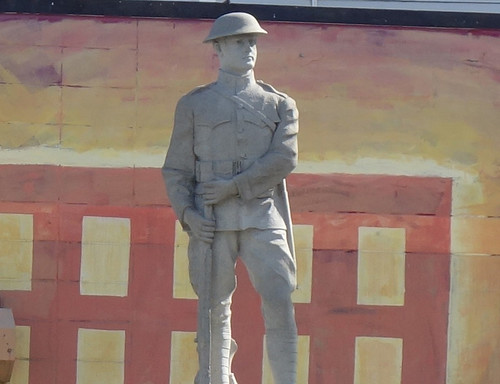Lowell in World War One: Sept 17 – Sept 22, 1917

This is the 23nd weekly installment of my Lowell in World War One series which commemorates the centennial of the entry of the United States into World War One. Here are the headlines from one hundred years ago this week:
September 17, 1917 – Monday – General reorganization of Russian Army under command of Gen. Alexieff. Confidence of troops restored. Korniloff uprising quelled without bloodshed. Government stronger than ever. Kerensky proclaims the Russian republic. 25,000 strike in San Francisco. Iron workers and metal trades mechanics were engaged in war construction. New Pawtucket Bridge opened to car service this morning. Officials made the first trip. The first electric car with passengers to cross the new Pawtucket Bridge left Merrimack square at 5:40 o’clock this morning. Aboard the car was Mayor James O’Donnell, Thomas Lees, the general superintendent of the Bay State Street Railway Co., and other officials. From now on, the Varnum avenue cars will carry passengers to the end of the line without changing cars, but Mammoth road passengers will have to change on the Pawtucketville side until the tracks are connected in two or three days.
September 18, 1917 – Tuesday – Japanese Mission welcomed to Boston by great crowd. Viscount Ishii says Japan owes much to Massachusetts. Germany denies sending peace “feeler” to US. More trouble over city contracts. Wrought Iron Range Co has filed a protest over the awarding of the contract for kitchen equipment at the Isolation Hospital. Fewer pupils at High School. The registration at the high school this year is 1590, down 100 from last year. All up for Lowell’s big agricultural fair which will be held this week at the Kasino on Thorndike Street.
September 19, 1917 – Wednesday – Head of Japanese Mission says US and Japan united to win freedom and liberty. Another victory for Rumanians. British casualties in week total 27,000. US will need all ships for overseas service. Close saloons on Friday. Bay State saloon keepers ordered not to sell liquor for two hours. To close while drafted men are leaving for Camp Devens, Ayer. Governor McCall will attend big Lowell Fair. Great activity today at Camp Devens. The Camp is in readiness to receive 40 percent of the drafted men from New England and northern New York, whose movement toward Ayer was begun this morning.
September 20, 1917 – Thursday – British Infantry goes “over the top” on wide front east of Ypres. Field Marshall Haig’s offensive seeks to force German abandonment of Belgian coast. Lowell’s big agricultural fair now in full swing. Parade of exhibits from North Common to Kasino. Fine display of farm products and livestock. Tomorrow will be “Governor’s Day.” Fair to continue for three days. The fair demonstrates how the people of this region are aiding the nation-wide food conservation campaign.
September 21, 1917 – Friday – Another German plot exposed. Bernstorff asked for $50,000 to influence Congress. Urged official German declaration in support of Ireland to gain support of Irish here. Governor McCall addresses Lowell boys before their departure for Ayer. Lowell’s second increment off for Camp Devens. Soldiers march from City Hall to Middlesex Street Station. Many touching parting scenes enacted. State’s Chief Executive introduced by Mayor O’Donnell.
September 22, 1917 – Saturday – Text of German reply to Pope. Central Powers accept Pope Benedict’s peace offer and are prepared to negotiate. 5 British steamers and 2 destroyers sunk. More men arrive at cantonments. Lowell men encamped at Newport News. James E. Kilbride, formerly of Company C of the Sixth Regiment which is now part of the 102nd Connecticut Infantry, wrote from Newport News where he and other Lowell residents await orders to embark for France.